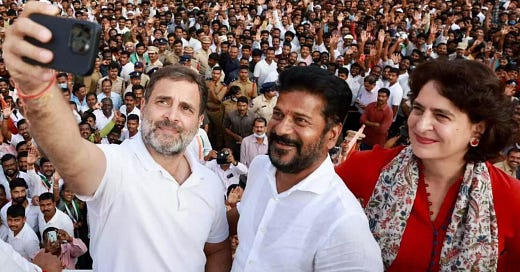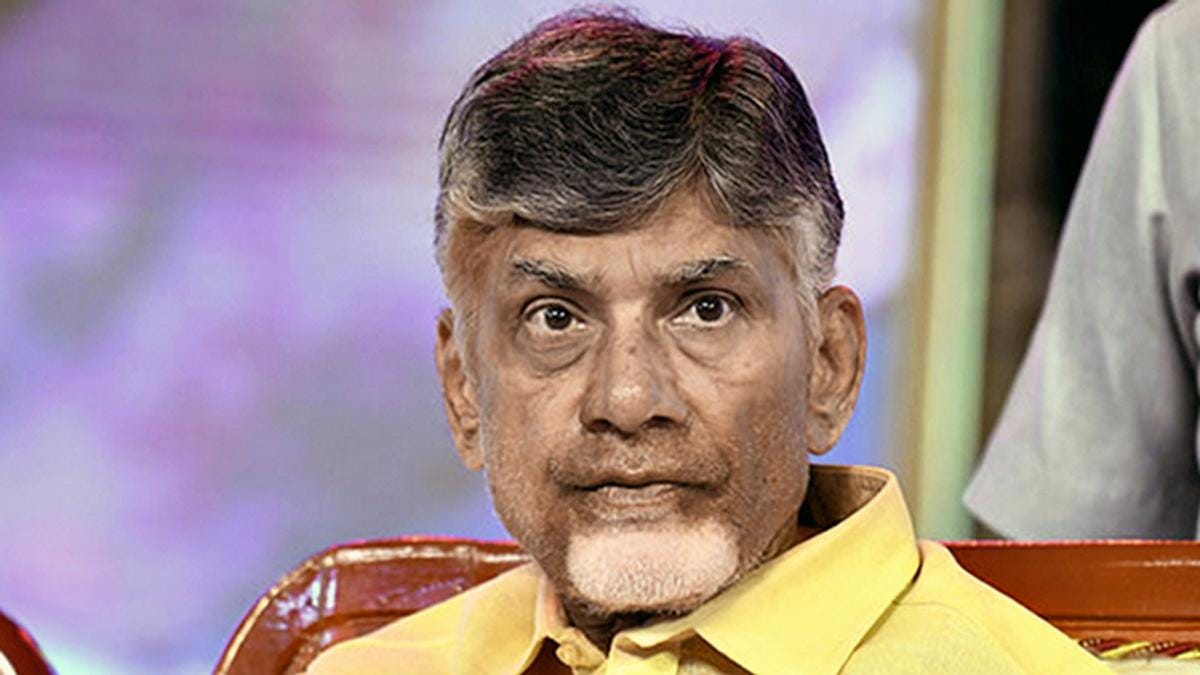The Secret Chandrababu Naidu-Congress Understanding that Dislodged KCR in Telangana
Not to underplay the hard work of CM-designate Revanth Reddy, the strategic decision by Telugu Desam Party to abstain from contesting in the Telangana elections was a big contributory factor.
A Political Shift in Telangana Reveals a Stealth Alliance
As Revanth Reddy prepares for his inauguration as the Congress Chief Minister of Telangana in Hyderabad at 10:28 AM on December 7, "The KBS Chronicle" is on the brink of releasing a sensational exclusive. This story uncovers the clandestine pact between the Telugu Desam Party (TDP) and the Congress, a pivotal alliance that significantly contributed to the political drubbing of K Chandrashekar Rao (KCR) in the recent Vidhan Sabha elections. This revelation was sourced from a retired, Hyderabad-based civil servant who played a crucial role in facilitating this secret collaboration and opted for anonymity. Adding weight to this revelation, other serving and retired IAS officers from both Telangana and Andhra Pradesh have broadly hinted at the existence of such an alliance, though without the direct knowledge claimed by our primary source, underscoring a profound yet obscured aspect of Telangana's political landscape.
The Central Debate in Strategy
The pivotal question faced by the Telugu Desam Party was whether to contest a select few seats in the Telangana Assembly elections, either on its own or in alliance with the Congress Party. This decision was of paramount importance, given the significant presence of about 20 lakh voters originally from Andhra Pradesh, now residing and registered as electors in Telangana, especially within the Hyderabad Metropolitan Area and its broader periphery.
Dissent of Telugu Desam’s Telengana Unit
The Telugu Desam Party (TDP), grappling with strategic decisions for the recent Telangana Assembly elections, faced internal debates over its participation. Under the guidance of its Telangana State Unit President, Kasani Gnaneshwar Mudiraj, the local TDP unit initially advocated for contesting independently. This stance aimed to establish a distinct presence in Telangana while positioning the party strategically for the 2024 Lok Sabha elections. However, in a significant turn of events, Mudiraj resigned in October 2023, voicing his strong dissent with the party's ultimate decision to not contest the state Assembly polls scheduled for November 30. Following this, the TDP abstained from the Telangana polls, leading Mudiraj to join the Bharat Rashtra Samithi (BRS), marking his entry into the party in the presence of Chief Minister K Chandrasekhar Rao.
Chandrababu Naidu's Calculated Move
Throughout this key period, Mr. Chandrababu Naidu was mostly unreachable, due to either his judicial custody or being on interim medical bail, which significantly restricted his direct political engagements. Our source was the chief interlocutor. In the midst of these developments, it's significant to note the political journey of Telangana's CM-designate, Revanth Reddy of the Congress Party. His political ascent began with the Telugu Desam Party, where he was elected MLA twice. Despite his departure from TDP in 2017 to rejoin the Congress Party, Reddy continues to express high esteem for Mr. Chandrababu Naidu, often recognizing him publicly as his political mentor.
The Voter Dynamics
After careful deliberation with his core team, Mr. Chandrababu Naidu concluded that the Telugu Desam Party should neither contest the Telangana Assembly elections directly nor openly endorse the Congress Party. This strategy hinged on the loyalty of the 20 lakh voters with Andhra heritage, who, due to their strong alignment with Naidu's Telugu Desam party and pride in their origins, were unlikely to support KCR’s TRS/BRS. Naidu anticipated that presenting official Telugu Desam candidates would have led this voter bloc to overwhelmingly support his party. The underlying reason for their aversion to KCR's administration lay in their treatment akin to 'mujahirs', despite their significant contributions to the development of businesses, investments, and social and commercial organizations in Hyderabad since 1956, the year Andhra Pradesh was formed on linguistic lines under Pandit Jawahar Lal Nehru.
The Shift of Votes and Analysis of Results
With Telugu Desam out of the fray, this voter bloc shifted their support aggressively to the Congress Party, seeking to dismantle what they perceived as KCR's discriminatory regime. The vote share difference between the Congress Party and TRS/BRS closely mirrors the number of Andhra-aligned votes, signifying their impact on the election outcome.
Chandrababu Political Foresight— Keeping Options Open
This raises the intriguing question: why didn't Chandrababu Naidu formally align with the Congress Party in the Assembly elections or actively urge his supporters to vote for them, especially when his own party wasn't fielding candidates? The answer lies in Naidu's astute political acumen. Despite the challenges posed by contentious and potentially politically motivated criminal cases, Naidu, a master strategist, is looking ahead. With the 2024 Lok Sabha elections on the horizon, he aims to keep his political options flexible, seeking to align with the national party that offers the most advantageous deal, be it the Congress or the BJP.
Reflecting on Past Political Manoeuvres
It's pertinent to recall that during the NDA Government's two tenures from 1998 to 1999, thence till 2004, under Prime Minister Atal Bihari Vajpayee, Chandrababu Naidu, then Chief Minister of United Andhra Pradesh and the leader of the Telugu Desam Party (TDP), with a significant number of Lok Sabha MPs, opted not to join the Central Government. This strategic decision allowed Naidu considerable leverage, enabling the election of his nominee, GMC Balayogi, as the Lok Sabha Speaker. Balayogi's untimely death in a helicopter crash in 2002 was a tragic loss. The Speaker's role was especially critical in a fragmented Lok Sabha, crucial for decisions on defections and disqualifications. Naidu's foresight in placing a trusted ally as Speaker, coupled with his move to avert the rise of parallel leadership within TDP, notably from figures like KCR who were then part of the TDP, underscored his strategic political thinking.
The Road Ahead for Chandrababu Naidu
The next pivotal challenge for Chandrababu Naidu lies in regaining his stronghold in residual Andhra Pradesh, with the Vidhan Sabha elections scheduled for April-May next year, likely coinciding with the Lok Sabha elections. Facing the incumbent Chief Minister of Andhra Pradesh, YS Jagan Mohan Reddy, who is completing his first term, Naidu could benefit from an undercurrent of anti-incumbency against Jagan Reddy. Enhanced by the extensive public outreach by Naidu and his son, Nara Lokesh, also the General Secretary of the Party, political analysts suggest a tilt in the electoral balance towards the Telugu Desam Party. Additionally, the arrest of the 73-year-old Naidu by a KCR-led YSR Congress government in Telangana has seemingly generated a wave of sympathy, bolstering the belief that he could not only triumph in the Andhra Pradesh Assembly elections but also secure a significant number of Lok Sabha seats both there and in Telangana.
Conclusion: The Unpredictable Political Landscape
This episode, as reported by "The KBS Chronicle," underscores an old adage in politics: "what is apparent may not be happening; what is happening may not be apparent." (जो होता है, वोह दिखता नहीं।जो दिखता है, वोह होता नहीं॥) In the intricate world of politics, only time will reveal how Chandrababu Naidu's strategic plans will unfold.
Request for Sharing
Understanding the intricate political landscape of Andhra Pradesh and Telangana is vital. We welcome your insights and comments on this story. If you know anyone interested in the politics of these states, please feel free to share this article. Your forwarding of this article through the Substack application or via email remains anonymous for us as well as the public viewers.






